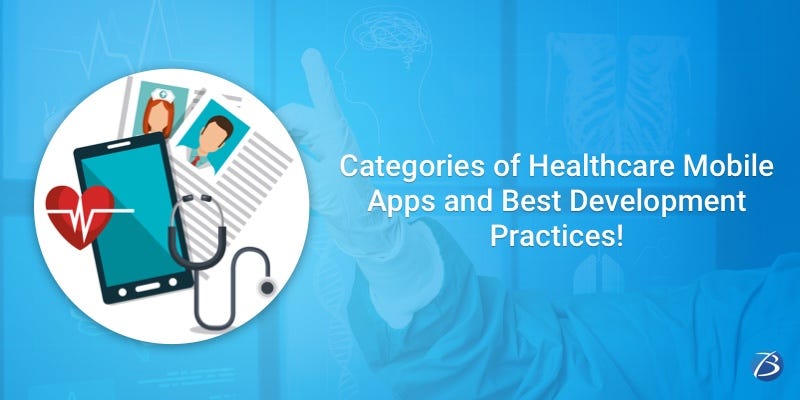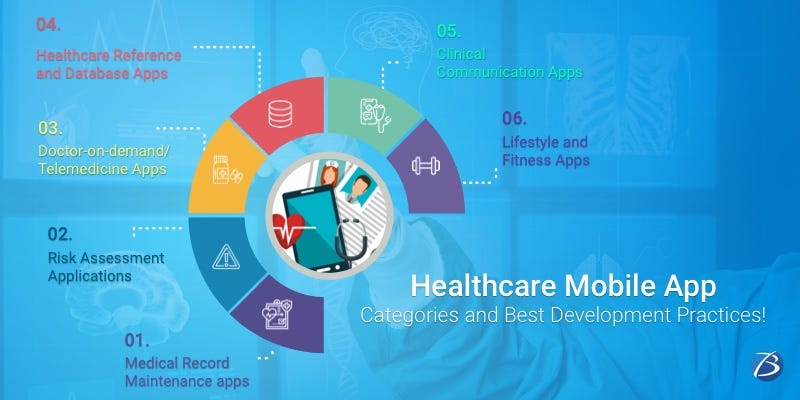ALL >> Health >> View Article
Healthcare Mobile App Categories And Best Development Practices!

The digital revolution has gifted the healthcare industry with pioneering healthcare app solutions that have transformed its functioning altogether. Owing to their innumerable advantages, Healthcare Mobile Apps have been widely adopted by practitioners, patients, medical facilities, and insurance providers.
Here are some numbers concerning the market size of these healthcare apps:
”As predicted by Statista, the market size for mHealth applications is going to exceed 50 Billion USD by the year 2025.”
This humongous demand for mHealth apps indicates that the Healthcare Mobile App Development market is booming with opportunities for businesses enterprises.
But, designing a flawless medical app solution that delivers a rich UX is no cakewalk. So, this post is meant for those who want to leverage this opportunity and create a healthcare app solution. The post enlists the key categories ...
... of healthcare mobile apps as well as the most effective strategies to implement during the entire app development process right from app ideation to monetization post-launch.
Healthcare Mobile Apps: Key Categories

Healthcare mobile apps come in various categories. The noteworthy ones are as follows.
Medical Record Maintenance apps
This category of mHealth apps come with the following functionalities:
• Scheduling doctor-patient appointments
• Easing out the process of updating patients’ records such as doctor visits, medical examinations, prescriptions, health parameters like blood pressure/sugar levels, etc. for tracking patients’ progress.
• Enabling practitioners to save healthcare info of patients using the prescription module
• Recording procedures and allowing searching patients via their I.D.
Risk Assessment Applications
These apps are integrated with wearable devices and EHR (Electronic Health Records) for real-time monitoring of medical conditions- tracking parameters like heart rate, identifying health risks in patients, electronic fetal monitoring for patients in labor (EFM), etc. Healthcare app developers often use machine learning techniques for pattern recognition when designing risk assessment apps.
Doctor-on-demand/Telemedicine Apps
Telemedicine apps commonly known as “doctor-on-demand”; provide patients the convenience of receiving doctor consultations as well as treatment from the comfort of their homes or offices. Patients can choose from a wide range of practitioners, book appointments, attend the consultation session via video conferencing, and make payments using an integrated payment gateway. Some special features of telemedicine apps include:
• A two-way video connection between patients and doctors
• Virtual waiting rooms that track the patients’ waiting time and allow them to gather the required information prior to consultation
• Options that provide patients the feel of attending offline appointments including EHR, in-built messaging, e-Prescriptions, etc.
Healthcare Reference and Database Apps
Such applications keep doctors informed about the most recent healthcare information concerning diseases, medical conditions, symptoms about diseases, medications, etc.
Clinical Communication Apps
These apps facilitate communication with clinical specialists in a healthcare facility and thereby improve the process of clinical decision-making. The features include messaging, voice chatting, file sharing, and maintaining EHR systems. Some examples are sending PACS and Lab results to doctors, EHR integration for editing patients’; records in real-time, and storing files on a cloud-based platform like AWS, Google Cloud, Microsoft Azure, etc.
Lifestyle and Fitness Apps
These apps are a blend of daily tips on healthcare and fitness, diet, nutrition, exercises, and training/courses for improving an individual’s well-being and state of mind. These apps also track sleep patterns and assist in practicing mindfulness.
Healthcare Mobile App Development: Major Strategies
Identify a Unique Selling Point
The mobile app market is flooded with various outstanding solutions. Therefore, the healthcare app you have envisioned wouldn’t taste success unless it has a unique selling point. For this reason, you need to:
• Conduct a thorough market analysis of the existing apps to identify the gaps that can be filled and the specific features that will provide additional value to your application.
• Analyze your target audience to figure out their pain areas and comprehend their requirements; so that you can develop a customized medical app solution that suits their needs.
• Carry out competitor analysis to gauge the minimum benchmark required to succeed and spot the mistakes they have committed.
Having a word with the stakeholders of the healthcare industry such as doctors, patients, nurses, paramedical staff, etc. will provide insights on creating an end-product that is effective, practically handy, and genuinely helpful.
Adopt an Omnichannel Strategy
The following perplexing questions should pop up before you commence the development process.
• Which device is most suitable for the app – a smartphone or a tablet?
• Which platform to pick – Android, iOS, or both?
• Is there any need to activate the app/website with Google Assistant or Siri?
• Would in-person interactions utilizing the camera prove more beneficial for the app?
Well, before you decide on the ideal blend of touch-points for your app, you must consider certain factors. We are living in an omnichannel world wherein digital users do not interact with an organization using only one channel, and so adopting a multi-touch-point strategy will work.
However, your touch-point strategy depends upon the preferences of your targeted audience as well. This is because the preferences of users belonging to different age groups are not the same. For instance, elderly consumers mostly prefer either a tablet or a website, whereas the youngsters are likely to interact with your healthcare solution using a mobile app and voice assistants like Google Home Skill or Alexa.
Opt for the MVP-first approach
Another crucial decision is choosing the right approach – “Whether to create a full-fledged app at one go or build an MVP first and then gradually add features through updated versions?” Developing a feature-packed healthcare app may sound like a lucrative option, but for expediting the success of the app, the MVP-first approach is good to go with.
An MVP refers to the most basic version including all the essential features. The MVP-first approach is profitable because it speeds up the time-to-market. Furthermore, you get an opportunity to validate your app idea and can utilize user feedback to add the right set of features incrementally, thereby adding value to your product.
Integrations and APIs
For promoting interoperability, it is necessary to integrate your app with EMRs and EHRs. Additionally, integration with fitness and healthcare wearables and utilization of AI algorithms for obtaining actionable and insightful inferences based on the collected data works wonders for optimizing healthcare outcomes. For this reason, you must ensure whether the corresponding APIs are available for commercial usage and if there is any need to open source your code after you use them.
Adhere to HIPAA and HITECH regulations
For making your healthcare app HIPAA compliant, you need to adhere to the HIPAA Privacy Rule and the HIPAA Security Rule.
HIPAA Privacy Rule sets national standards in the United States for protecting the health records of individuals as well as their personal healthcare information including medical clearinghouses, health plans, etc., and the medical providers conducting healthcare transactions electronically. This rule limits the usage and disclosure of patient information without their authorization, provides patients the right to obtain a copy of their medical data and request corrections, etc.
As per the HIPAA Security Rule, apt technical, physical, and administrative standards have to be maintained for ensuring the security, confidentiality, and integrity of electronic medical data.
HITECH, the Health Information Technology for Economic and Clinical Health Act, mandates the adoption and meaningful utilization of health information technology in mHealth apps. It addresses the safety and privacy concerns related to the electronic submission of medical information and facilitates the civil and criminal enforcement of HIPAA regulations.
Conduct Extensive Testing
Healthcare apps require rigorous testing to ensure the creation of an impeccable end-product. This is because the bar for accuracy, quality, safety, and security is considerably high; and your app must conform to the highest standards of quality assurance before you publish it on the app store. Check out the standardized testing approach all medical app testers need to follow.
• To ensure confidentiality and privacy of healthcare data, set up stern authorization and access control measures within the app. This way the data will be delivered to only the intended recipients.
• Medical data being a soft target for hackers, testers need to identify and get rid of all areas of vulnerability. So, encrypt data via a transport layer security to enable data validation within the app.
• A usability test is crucial as even a minor error can lead to clinical issues and adversely impact the app’s overall outcome.
• Test the app against high load and performance benchmarks as ready access to patients’ data has to be provided whenever needed.
Plan App Monetization Strategies
Take a look at the commonest app monetizing strategies.
• Offering free trials to users in case of paid apps
• Adopting the models of in-app purchases and subscription
• Generating revenue via advertisements and medicine sales
Final Verdict:
I hope this post has enlightened you about the key areas you need to watch out for while developing a disruptive healthcare mobile app. Contact us for further queries.
If you have already built a fully functional Healthcare application, let us know your experiences in the comments section below.
To know more about our core technologies, refer to links below:
Add Comment
Health Articles
1. Is Piles Curable Permanently? Ayurvedic Doctor ExplainsAuthor: Cure Roots
2. What Is Genetic Testing And Why Is It Used?
Author: Suborna Fermi
3. Fms Dental Offering High-quality Zirconium Dental Crowns In Hyderabad With Advanced Technology
Author: Prashanth
4. Dentures Implants Recovery: What To Expect After Implant Replacement ?
Author: North Tabor Dental
5. Top 5 Dermatologist In Jaipur – Expert Skin & Hair Care Guide (2026)
Author: Dr. Meenal Makkar
6. What Causes Bad Breath And How To Treat It Effectively
Author: Dr Gurinder Matharu
7. Why Every Home Needs A Reliable Organic Grocery Store
Author: Sunil Kanwarjani
8. Can Stress Cause Neurological Problems?
Author: Purple Heron Hospitals
9. What You’re Really Paying For With Arthrosamid Injection Uk
Author: drsna
10. Expert Knee Replacement Surgeon Nairobi: Restoring Mobility & Confidence
Author: reviveorthospine
11. Skilled Nursing Facility Billing Rule Changes In 2026
Author: Meenu
12. Best Spine Specialist In Africa: Personalized Care For Faster Recovery
Author: reviveorthospine
13. Advanced Dental Veneers Philadelphia And Gum Recession Treatment Philadelphia For Long Lasting Confident Smiles
Author: Frank Williams
14. Why Provider Practices Struggle With Billing Accuracy Without Expert Support
Author: Gavin Ellis
15. Top 5 Benefits Of Potli Massage Therapy In Vajarahalli
Author: Sthira Holistic Health Centre








